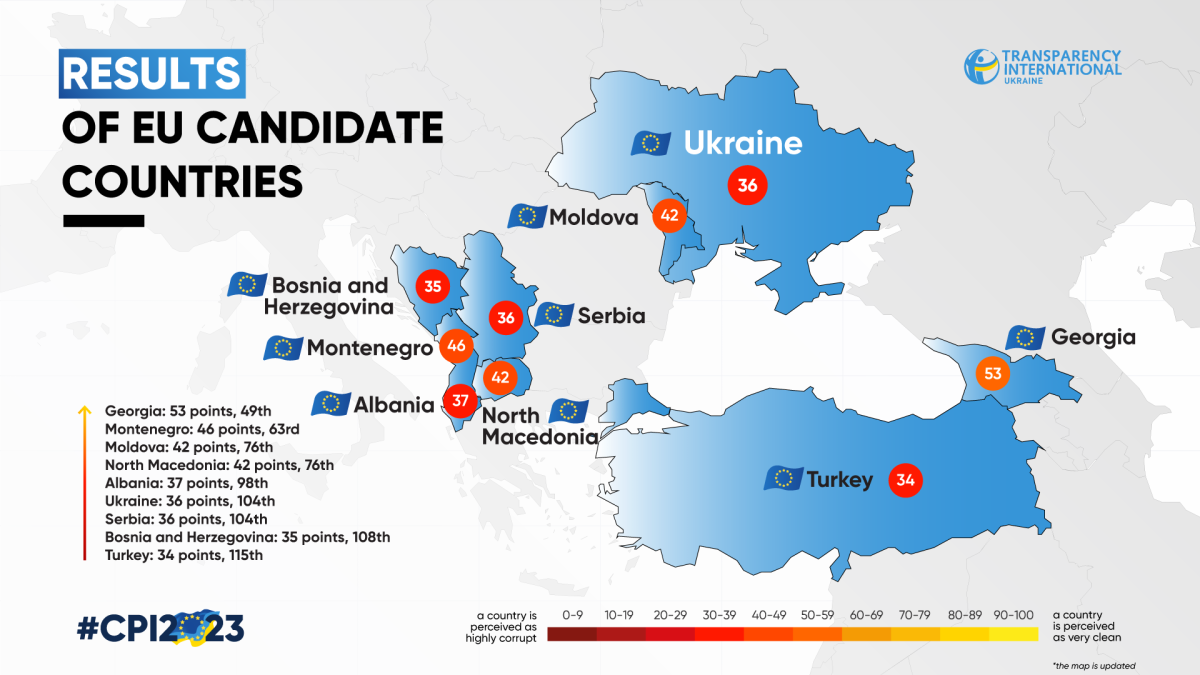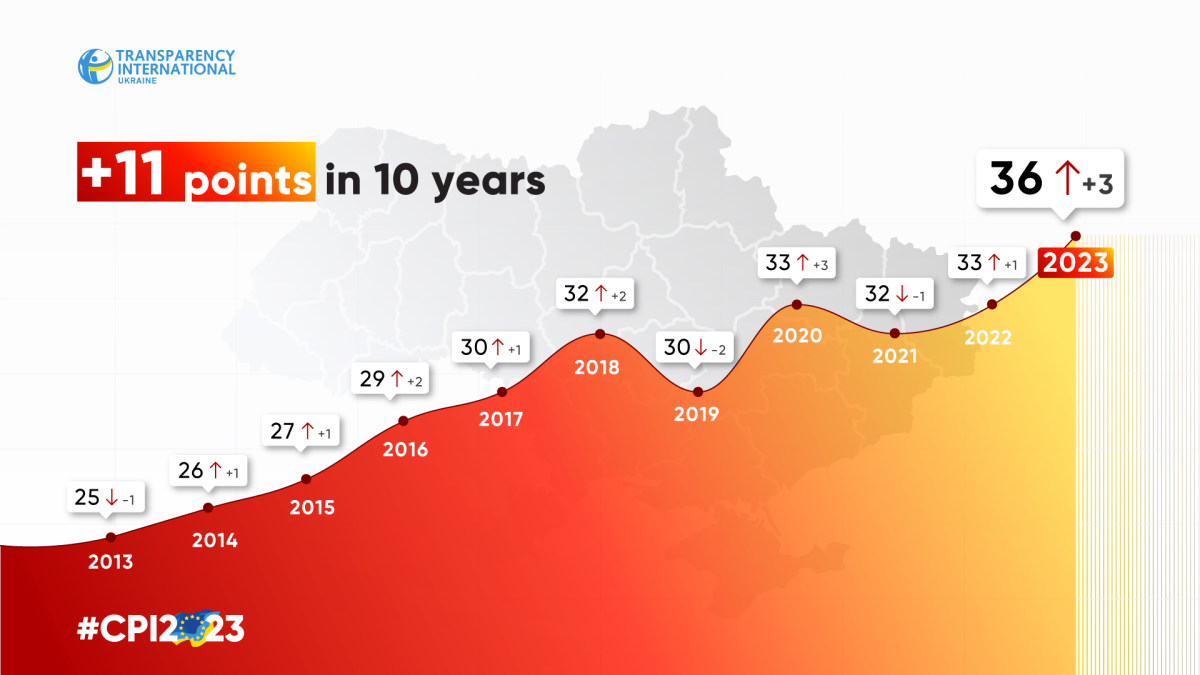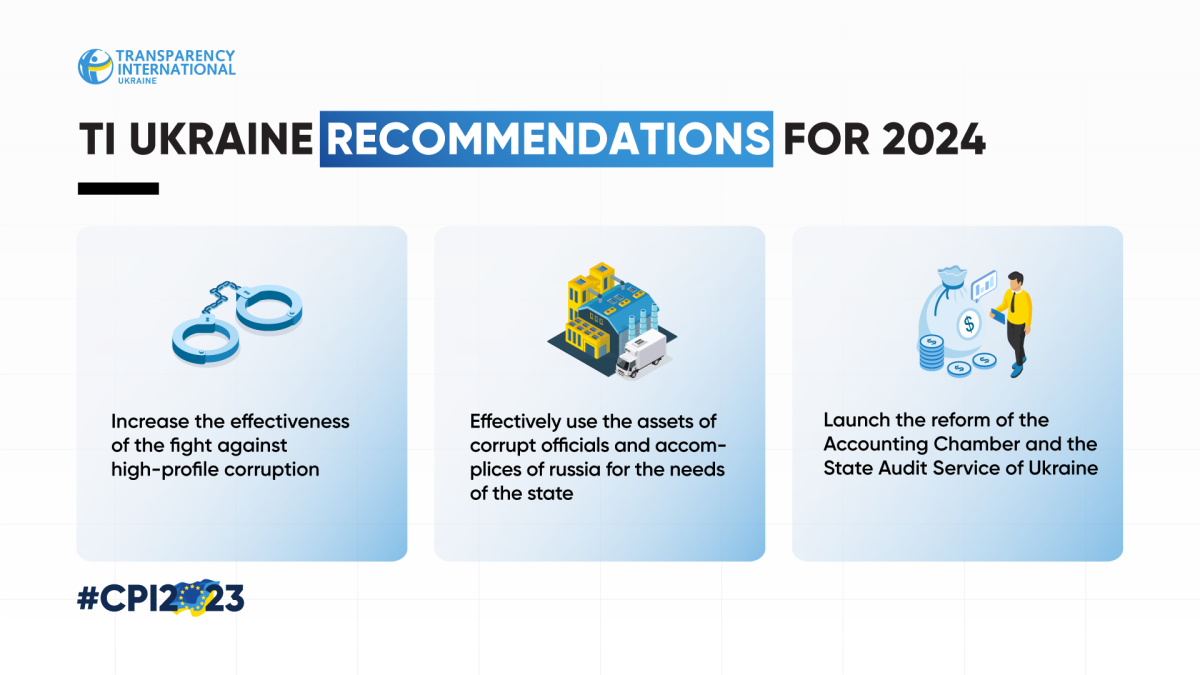

Ukraine scored 36 points out of 100 in the 2023 Corruption Perceptions Index (CPI); now our country ranks 104th out of 180 countries.
Ukraine’s growth by 3 points is one of the best results over the past year in the world. Ukraine is also one of the 17 countries in this year’s CPI that have shown their best performance ever.
Algeria, Brazil, and Serbia also scored 36 points, according to the results of this year’s study. Albania, Argentina, belarus, Gambia, Ethiopia, and Zambia are one point ahead of us; these countries scored 37. Bosnia and Herzegovina, the Dominican Republic, Egypt, Nepal, Panama, Sierra Leone, and Thailand scored one point less than Ukraine.
The results of other EU candidate countries are as follows: Georgia lost 3 points (53 points, 49th), Montenegro scored 1 point (46 points, 63rd), Moldova scored 3 points (42 points, 76th), North Macedonia scored 2 points (42 points, 76th), Albania scored 1 point (37 points, 98th), Ukraine scored 3 points (36 points, 104th), Serbia’s score did not change (36 points, 104th), and Bosnia and Herzegovina scored 1 point (35 points, 108th). Among the EU candidate countries, Turkey scored the least, with a decrease of 2 points (34 points, 115th).
Among its neighbors, Ukraine’s score compared to that of russia increased even more; the terrorist country lost 2 points in 2023 and ranks 141st in the list with 26 points. In addition, the score of belarus continues to decline; this year, it also lost 2 points, and although it is still ahead Ukraine, its tendency to fall in the CPI persists.
Among our western neighbors, the indicator of Romania remained unchanged (46 points, 63rd), while Poland lost another point, but remained one of the leaders in terms of the CPI among countries close to us: with 54 points, it now ranks 47th. Currently, Poland shares this position with Slovakia: it scored 1 point and now has 54. Moldova, like Ukraine, scored 3 points and caught up with Hungary, whose points did not change; now they come 76th with 42 points.
Global leaders and outsiders of the Corruption Perceptions Index 2023 have hardly changed. Denmark tops the list with 90 points. It is followed by Finland with 87 points, New Zealand with 85 points, and Norway with 84 points.
The outsiders in this year’s study also remained unchanged. Somalia lost 1 point and with 11 points comes 180th. South Sudan and Syria, which scored 13 points each and ranked 177th, were joined by Venezuela with the same indicators.
Ukraine's growth by 3 points is one of the best results over the past year in the world. Ukraine is also one of the 17 countries in this year's CPI that have shown their best performance ever.
What impacted Ukraine’s indicator in 2023?
The results of Ukraine, like last year, were calculated based on 8 studies covering the period from February 2021 to September 2023.
Three of them (Bertelsmann Foundation Transformation Index 2024, World Economic Forum Executive Opinion Survey 2023, Varieties of Democracy Project 2023) showed a significant increase in Ukraine’s indicator. Another (Political Risk Services International Country Risk Guide 2023) showed a slight decrease in the score.
In the other four studies, the indicators did not change: Freedom House’s Report on Nations in Transit (study period — 2022) — 35 points, Global Insights Country Risk Ratings 2022 — 35 points, World Justice Project Rule of Law Index according to an expert survey conducted in February-June 2023 — 33 points, The Economist Intelligence Unit Country Risk Ratings 2023 (as of September 2023) — 20 points.
The study of Bertelsmann Foundation’s Transformation Index 2024, according to which Ukraine scored 12 points, was conducted from February 2021 to January 2023 and covered the opinions of 280 experts from around the world. They, in particular, assessed the extent to which officials who abuse power are persecuted or punished. Therefore, we can state that the corruption scandals that we witnessed until January 2023 inclusive were reflected in this study. According to this study, a country loses points if “officeholders who break the law and engage in corruption can do so without fear of legal consequences or adverse publicity.”
The World Economic Forum Executive Opinion Survey 2023, according to which Ukraine scored 8 points, was conducted in April-August 2023. Business executives answered questions about the prevalence of budget funds falling into the hands of individual companies or individuals as a result of corruption. Therefore, we can conclude that conducting most public procurement transactions at the expense of the budget through tender procedures in the Prozorro system helped Ukraine score in this study, despite the continued war.
Over 4,000 experts from different countries work on the Varieties of Democracy Project 2023, conducted throughout 2022; according to it, Ukraine scored 5 points. The CPI includes indicators of corruption in the public sector, in particular, in the executive, judicial, and legislative branches.
Therefore, in our opinion, the process of adopting the State Anti-Corruption Program (SAP) based on the previously adopted Anti-Corruption Strategy had a positive impact on the result. After all, the implementation of more than 75% of the measures planned in the SAP falls on the executive branch. The SAP also contains sections on fair trial and ensuring the integrity of political parties and election campaigns (recording the need for standards of ethical conduct of MPs).
The Political Risk Services International Country Risk Guide 2023, according to which Ukraine lost 2 points, covered the period from September 2022 to August 2023. The PRS Group, based in New York, assesses corruption within the political system. In this study, among the risks, analysts note the secret financing of parties. Accordingly, this indicator did not reflect the resumption of political parties reporting to be verified by the NACP, which came into force a month ago after an almost 4-year break.
The results of Ukraine, like last year, were calculated based on 8 studies covering the period from February 2021 to September 2023.
Which anti-corruption steps Ukraine needs to take, according to its allies
On December 14, 2023, the European Council adopted a historic decision to start negotiations on Ukraine’s accession to the EU. What should Ukraine do for truly successful European integration? What do Europe and our Western partners expect from us?
The answers to these questions can be found in the following important documents:
- 2023 EU Enlargement Report on Ukraine as a candidate country
- List of priority reforms from the White House
- The latest report on the implementation of the memorandum between Ukraine and the IMF
Among these documents, the basis for our European integration is the first one — the report of the European Commission (EC). It is upon the implementation of its main recommendations that the European Council in March 2024 will decide whether to adopt a negotiating framework for the actual meaningful start of Ukraine’s accession negotiations.
That is, by the time the first section of the negotiations on fundamental rights opens, Ukraine should have fulfilled the previous seven requirements of the European Commission. The recommendations were provided together with the candidate status in summer 2022, and four more—in the November report of the EC.
For example, in the report, the EC noted that to ensure the effectiveness and sustainability of efforts to combat corruption, Ukraine needs to continue effectively investigating, prosecuting, and adjudicating high-level corruption cases, including the seizure and confiscation of criminal assets.
To cope with the increasing burden on the bodies of the anti-corruption ecosystem, the European Commission advises increasing the number of NABU employees, SAPO prosecutors, and judges of the High Anti-Corruption Court. Interestingly, all this resonates with the list of priority reforms from the United States, which also covers almost all anti-corruption problems in our country.
Of course, the structural benchmarks of the requirements of the memorandum with the IMF to some extent coincide with the above documents. Moreover, Ukraine and the IMF jointly note that they will not allow for a retreat from the progress achieved in anti-corruption reform because these efforts will also contribute to strengthening public trust and donor confidence.
But, more importantly, all these documents reflect not only the demand of international partners to the Ukrainian authorities, but also the needs of Ukrainian society as well! According to the results of the second wave of our sociological survey at the end of 2023, 88% of Ukrainians are now concerned with corruption risks. The population sees corruption as the greatest danger in the process of Ukraine’s recovery, with two parameters at once: lack of control and, as a result, embezzlement of funds (79%) and the resumption of corruption schemes (75%).
Citizens might not understand the features of strengthening the anti-corruption ecosystem and determining the necessary recommendations, but they are fully aware of the impact of corruption on their lives and the importance of assistance from international partners. Now we can see that Ukrainians clearly realize that continuing anti-corruption reforms is not only in the interest of the West, but also in ours as well.
Citizens might not understand the features of strengthening the anti-corruption ecosystem and determining the necessary recommendations, but they are fully aware of the impact of corruption on their lives and the importance of assistance from international partners.
TI Ukraine recommendations for 2024
Transparency International Ukraine provides 3 comprehensive steps that will help improve the level of anti-corruption and contribute to Ukraine’s European integration processes in 2024.
1. Increase the effectiveness of the fight against high-profile corruption
- Increase the capacity and conduct an objective competitive selection of NABU employees, SAPO prosecutors, and judges of the High Anti-Corruption Court.
- Launch forensic service reform to ensure timely and sustainable access to forensic expertise in high-level corruption investigations.
- Eliminate contradictions in criminal legislation and ensure that criminal cases are considered within reasonable terms.
2. Effectively use the assets of corrupt officials and accomplices of russia for the needs of the state
- Amend management selection procedures and conduct an independent audit of the ARMA’s activities. Increase the efficiency of asset management and sale.
- Improve confiscation mechanisms and the legal framework for asset recovery, aligning them with international standards.
- Improve the processes of blocking (pro-)russian assets (as sanctions preceding confiscation) and introduce criminalization of sanctions circumvention.
3. Launch the reform of the Accounting Chamber and the State Audit Service of Ukraine
- Develop and approve a draft law on reforming the Accounting Chamber and update the procedure for selecting its management and members. Prior to the legislative reform, the selection and appointment to the Accounting Chamber should be suspended.
- Shift the focus of the monitoring of public procurement by the State Audit Service from post-control to prevention. Monitoring and identifying significant violations should precede the conclusion of a contract to prevent losses and other negative consequences.
Transparency International Ukraine provides 3 comprehensive steps that will help improve the level of anti-corruption and contribute to Ukraine's European integration processes in 2024.
CPI study: how it works
The Corruption Perceptions Index (CPI) is a ranking calculated by the global organization Transparency International since 1995. The organization itself does not conduct its own surveys. The Index is calculated based on 13 studies by reputable international institutions and think tanks.
The key indicator of the Index is the score, not the rank. The minimum score (0 points) means that corruption effectively replaces the government, while the maximum (100 points) indicates that corruption is almost absent in society. The index assesses corruption only in the public sector.
The CPI includes the perspective of business representatives, investors, market researchers, etc. It reflects the private sector’s point of view and its perception of corruption in the public sector.
It is important to keep in mind that the CPI measures the perception of corruption, not the actual level of corruption. A higher score of one country compared to another does not mean that the former has less corruption than the latter; it means that the former is perceived as less corrupt.
The CPI methodology received a seal of approval from the European Commission for its reliable statistical approach.
The CPI covers the perception of corruption in the public sector by experts, including bribery, embezzlement of public funds, nepotism in the civil service, capture of the state, the government’s ability to implement integrity mechanisms, effective prosecution of corrupt officials, excessive bureaucracy, availability of adequate laws on financial disclosure, prevention of conflicts of interest and access to information, ensuring the protection of whistleblowers, journalists, and investigators.
Why is CPI necessary?
- The CPI covers more countries than any single source.
- The CPI compensates for the error in different sources using the average of the results of at least three different sources.
- The CPI scale of 0 to 100 is more accurate than other sources, as some have a scale of 1 to 5 or 1 to 7, which results in many countries receiving the same results.
- The CPI balances different perspectives on corruption in the public sector and has a neutral approach to different political regimes.
The key indicator of the Index is the score, not the rank.
Global Trends of Corruption Perception in 2023
Two-thirds of countries score below 50, and over 80% of the world’s population lives in countries with CPI scores below the global average. This indicates serious corruption problems at the international level.
As in previous years, no country in the world scored a maximum of 100 points. The leader, like last year, is Denmark with 90 points, whereas Somalia took the bottom spot with 11 points.
The key theme of this year’s CPI at the global level was the relationship between corruption and improper justice. When bribery and political interference infiltrate the justice sector, this can lead to the manipulation of legal processes, selective enforcement of the law, and the shielding of perpetrators from accountability. This benefits a small number of wrongdoers at the expense of the common good.
To end impunity for corruption, Transparency International suggests that governments give justice systems the independence, resources, and transparency needed to effectively punish all corruption offenses and provide checks and balances on power.
TI experts also recommend appointing people to public positions based on their merits, not political beliefs. They also encourage countries to improve international cooperation, which will help identify and prosecute cases of cross-border corruption.
After all, corruption and the rule of law are closely intertwined. When justice can be bought or be politically interfered with, laws stop applying equally to all, serve private interests rather than the common good.
Such laws are not able to deter abuse of power, which many countries have already experienced, Ukraine included.
Given all the above-mentioned statements, Transparency International notes that the control of the authorities over the judiciary and law enforcement agencies to preserve impunity for high-profile corruption can become an obstacle for Ukraine on its way to the European Union. Therefore, our country needs to continue its efforts and ensure the inevitability of punishment for already exposed and proven corruption crimes.










